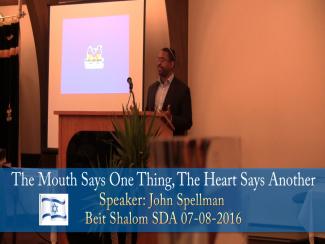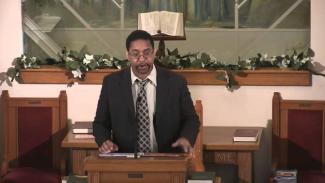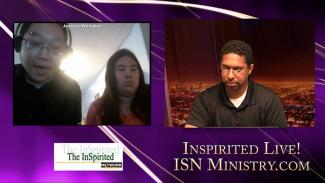Have you ever been asked to do something by a friend or family member that you didn't want to do? Have you eve been asked to do something and, although you didn't want to do it, you couldn't say no? Have you ever said you were going to be somewhere and purposely didn't show up? This sermon is about doing God lip service. There are times when we say things we don't mean and honor God with words, but we don't follow through with action. What kind of service does God expect from His people? This sermon talks about sanctification, God's power to transform our lives, and how to avoid hypocrisy.
Topic: Law
To see more broadcasts select show names, a year, or all video media.John Spellman speaks at the Patchogue SDA church on the story of Daniel in the lion's den and it's connection to our time today. Is it possible for unjust laws, policies, or rules to be made which threaten God's faithful followers? What would you do if you had to choose between standing for your faith or compromising with the world? Can a Christian always get along with everybody? Does God still deliver people in times of trouble today? Discover how the worst things can begin with good intentions.
Why did Jesus have run-ins with the scribes and pharisees? Were the accusations against him true? Was Jesus a breaker of the Sabbath? Did He view the Sabbath as important? What was His message regarding the Sabbath and the legalistic regulations of the religious leaders? What message might this have for us today? Jesus invites us to take part in His rest. But what kind of rest was He talking about?
John Spellman speaks on the 1st Angels message. What does this message have to do with our time today? Should it still be preached in churches? Why is the Sabbath the center of controversy in today's world? Why is Creation so important to our faith? If the hour of judgment is come, what does that mean for believers today? This presentation focuses on the ever-lasting gospel that must be preached to all before the end can come.
How influential was Jesus' sermon on the mount? What did these powerful words mean? What was the purpose behind the sermon and what did it mean for believers? What was so radical and different about the words of Jesus? Do they still apply to us today? How did Jesus establish the relationship between law and grace? Did Jesus use this sermon to replace the law? Did His sermon replace a system of legalism? Or was salvation always by grace? What did Jesus mean by exceeding the righteousness of the Pharisees and Scribes? This week we explore Jesus' sermon on the mount.
What was the mission and message of Paul all about? What could we say was central to his message? What did Paul preach? How did he adapt his message to reach different kinds of audiences? How important was the concept of the resurrection in Paul's teaching? In this lesson we will explore the techniques Paul used to reach Jewish and Gentile audiences. Like Jesus, Paul used what was familiar to his listeners to explain what was unfamiliar to them. In looking at how Paul did this, we can learn a great deal about teaching spiritual truths to people today.
What can we learn from Peter's outreach to the gentiles? How did it contrast from Paul's? What can we learn from the story of Cornelius and the conversion of his friends and family? What important lessons did Jews of the early church have to learn? What might that mean for the church today? Does culture or race matter when it comes to salvation? This week as we explore these lessons we'll look at the stories of early gentile converts to Christianity.
What is the Sabbath? Which day did God set apart as Holy in the weekly cycle established in Creation? What does Jesus being Lord of the Sabbath have to do with us today? What is the purpose of the Sabbath? Did Jesus' healing on the Sabbath show contempt and disregard for the Sabbath? Why was Jesus often accused of breaking the Sabbath? Did He really break it? What does this mean for Christians today? This week we study Luke's account of Jesus' relationship with the Sabbath.
This week we discuss Solomon's themes of law as it relates to light and life. How can God's law function as a light in our lives? What does it mean to have the law written on the heart? Does God really want us to tie commandments to our heads, hearts, necks, and hands? How should we interpret these passages of scripture? What does Solomon have to say about resisting temptation? In this study we explore Solomon's advice: including why one must resist the adulterous woman. What important lessons does Solomon focus on here and why are they so crucial?
What is the relationship between faith and works? Should our faith motivate us to do works? Is it possible to have faith and take no action on it? Was there a difference between what Paul said about faith and works in comparison to James? What does it mean to have true faith? This week we continue our study of the book of James looking at faith that works.
James had a lot to say about love and law. He corrects the church, rebuking the partiality and favoritism of the wealthy while many neglected the poor. James discusses how partiality transgresses the law of love. But how? Is there more to the law than we understand at surface value? Does the fairness with which we treat each other impact our keeping of God's Commandments? Can a person keep the Commandments yet not care for the poor? Can one be a Commandment keeper and be wealthy? What does love have to do with God's Law and justice. We explore these topics this week.
What will God's kingdom be like? Will there be potential for the sin problem to rise up again? What does God do in the lives imperfect people? Will the saved have to obey God's law throughout eternity? Is it even possible to obey God? What does the New Covenant tell us about the kingdom of God? This week we explore these topics.












